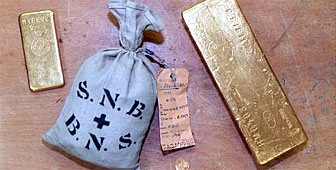Gold in demand since US terror attacks

Demand for gold has increased since the September 11 terrorist attacks in the United States, as buyers seek safe haven investments.
Erhard Oberli, chief executive of the Swiss-based precious metal refiner Argor-Heraeus, told swissinfo that these sorts of investments had diminished prior to the events of September 11.
“The investors had almost totally disappeared before the horrible events of September 11, but now we can see they are coming back partially,” said Oberli.
“We are seeing increased demand for smaller bars from small investors who are buying 10, 50 or 100 gram bars and also more demand for kilo bars from institutional investors.”
Gold is now trading at $274.90, up $4 from the morning opening of September 11. It had risen by $16 immediately after the attacks.
50 years in precious metals
Argor-Heraeus, which is celebrating its 50th anniversary this year, is among the country’s largest refiners with 15 per cent of the world’s gold refining capacity at its Mendrisio plant, in the Italian-speaking canton of Ticino.
Security at the Mendrisio plant is tight. A high perimeter fence surrounds the factory with regular random inspections of staff and visitors leaving the premises.
Argor-Heraeus produces not only gold bars for investors, but also a range of semi-finished precious metal products in gold, silver and platinum for the jewellery and watch making industries.
“We started in Chiasso in 1951 as a small company casting gold bars mainly for the Italian market,” explained Oberli. “Then UBS as a main player on the physical gold market became a main shareholder taking 80 per cent in 1960 and then in 1972 it took 100 per cent of the shares.”
Argor-Heraeus is no longer controlled just by UBS, which sold its remaining stake in the company back in 1999. The firm is now controlled by a group of investors that includes not only the management in Mendrisio but also Germany’s Commerzbank and high-tech German metal refiner Heraeus.
Changing production to meet demand
In the 1980s Argor-Heraus’ main market was investors who wanted gold bars in their vaults, however as the gold market became more volatile, demand slowed.
“Previously all the gold produced by the mines was absorbed by investors, but afterwards the market totally changed as investors weren’t happy with the market performance of gold. Now the main consumers are the jewellery and watch industry so we produce metal in a form they can use directly in sheets and wires as alloys of mainly 18 carat gold – which means it has a 75 per cent gold content.”
Of course, production of gold bars at the Mendrisio plant, which employs around 100 staff, is once more being increased to meet the recent surge in demand following the events of September 11.
But while increasing production in this area the company also plans to increase production in the semi-finished products area over the coming years.
Why Switzerland
Switzerland is one of the world’s major precious metal refiners, due in part to the Swiss banking sector and its heavy involvement in the previous metals markets.
The country’s location in the centre of Europe has also helped the refiners, but not to be forgotten is the strong domestic demand for semi-finished precious metal products, which comes from the indigenous watch and jewellery sector.
Switzerland is also a favourite among customers because of the stringent requirements of the government regarding quality and means of precious metal refining. Argor-Heraeus not only has to meet these requirements but also international standards as well.
“We are accredited at the London Bullion Market Association as a so called good delivery producer so that our products are recognised on all commodity markets,” explained Oberli.
Environmental concerns
Any form of industrial refining raises environmental questions. Gold is no exception; being one of the earth’s most noble elements it requires strong acids and chemicals in the refining process.
However, Oberli said the stringent Swiss environmental regulations are being more than merely met by Argor-Heraeus.
“You have to protect the environment so we have installed very sophisticated water treatment and air treatment facilities,” Oberli added.
“We have invested some millions in these plants and we’re very proud to have more than fulfilled the very rigid Swiss environmental protection laws.”
by Tom O’Brien

In compliance with the JTI standards
More: SWI swissinfo.ch certified by the Journalism Trust Initiative








You can find an overview of ongoing debates with our journalists here . Please join us!
If you want to start a conversation about a topic raised in this article or want to report factual errors, email us at english@swissinfo.ch.